Summer camp gives Fukushima kids change of scene and some new experiences
2012/09/10
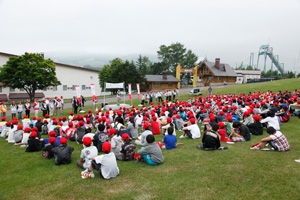
By Francis Markus in Hokkaido
It’s the final evening of summer camp for this batch of 300 children, and the last few hours have been a washout, with torrential rain forcing the organizers to cancel all the outdoor activities in the afternoon.
(Photo: Summer Camp Opening ceremony at Rusutsu village, Hokkaido)
But that doesn’t seem to have dampened the spirits of these resilient youngsters from coastal areas that were devastated by the great eastern Japanese earthquake and tsunami.
In the dining area of the sprawling mountain resort complex, they’re working on a final exercise: writing a letter to themselves 10 years in the future.
“In ten years time, some of the children will turn 20,” said Tomokazu Sato, one of the Japanese Red Cross Society staff organising the session. “One decade is a long of time and children themselves cannot imagine what will happen in the next 10 years. By writing these letters, I want give them a chance to look at themselves with an objective eye, and paint or imagine a picture for the future they wish.”
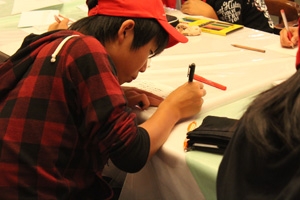
It’s the culmination of a three day camping trip designed to help them put the worries and stresses of the disaster behind them, having a joyful time with new friends and being able to draw strength from their common experience.
(Photo: Writing a letter to themselves 10 years in the future is an exercise which allows youngsters to think about their dreams.)
The children are asked not to compare notes and collaborate on the letters, because the exercise should be something deeply personal.
But the letters - which a few of the participants agreed to share with visitors - showed considerable maturity and self-awareness, and an ability to find the best ways through difficult and painful experiences.
The letters explore their dreams such as becoming an archeologist, or helping other people if there’s a fresh earthquake – or simply finding love and confidence in life.
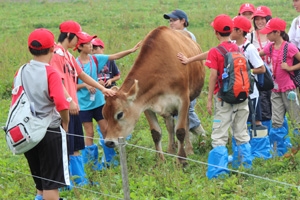
That’s only the final – you could say formal – exercise in three-day long experience, which gives them a broad spectrum of activities.
(Photo: A visit to a dairy farm nearby is just one of the activities which children can choose, allowing them to have experiences which they can’t necessarily have at home.)
On one day, when the weather was cooperative, we went with the children as they visited a nearby dairy farm and had all kinds of fun such as feeding milk to young calves, petting the cows in the field, and finally trying their hand at making butter.
That followed a session making traditional Japanese Udon noodles, from mixing the dough, to rolling it into huge sheets and chopping it up into fine strips ready for the soup.
The themes running through the whole camp, though, are learning new skills and socialising in a stress-free environment.
“I want children coming from Iwate, Miyagi, and Fukushima to feel that they are living together through this summer camp. After the earthquake, they have been feeling stress and went through experiences which are intolerable even for adults,” says Sato. “Now, I want them to know that there are people who share their experiences, even though they are living far apart.
That is clearly an important dynamic. When 11-year-old Airi spent a year at a school in Tokyo, staying with her grandparents, she said many children in the city were curious about where she had come from. “They asked me a lot of questions about the tsunami and the nuclear accident and whether our house was affected,” she said.
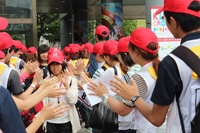
That kind of discussion isn’t necessary at the summer camp. A Japanese co-worker sums it up. “The fact that they have all been through the same kinds of things, is really important.
(Photo: After the closing ceremony, all the staff held hands and formed an arch where particpants went through.)
“My parents got divorced when I was 11 and I was terribly sad. I thought I was the only one facing this issue and if I could have been together with other kids in the same position, it would have been much better.”
Having benefited from that ‘togetherness’ over the three days, the children are clearly gaining strength from their experiences in the disaster. And that will surely help them and the whole community in Fukushima, and beyond, to move forward on the road to recovery.
-
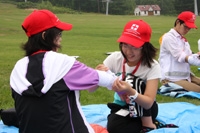
First aid lectures were also given.
-
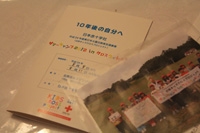
letter to myself 10 years
-
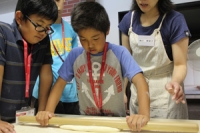
Udon making
-
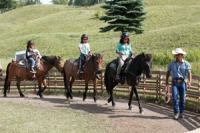
One of elective activities was horseback riding.















